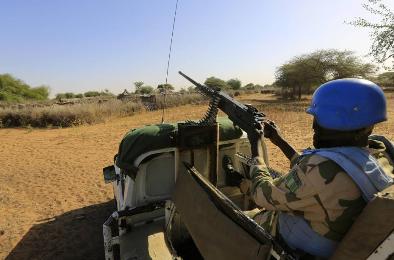Sudan slams Reuters over report it denied visas for UN diplomats
April 22, 2015 (KHARTOUM) – The Sudanese mission at the United Nations (UN) said that it had been in touch with the Reuters bureau chief at the UN Louis Charbonneau to protest a story published yesterday alleging that Khartoum declined to issue visas for US, British and French diplomats seeking to visit Darfur.

SUNA said a statement was circulated by the mission disclosing that they were following up with the UK mission on the proposed visit which was described at the time as a field visit.
“Surprisingly, Reuters [news] agency is unveiling the hidden goal of this visit, which was a fact-finding mission according to its story,” the statement reads.
It asserted that they were inclined to oppose the visit over its purpose and format as it did not include all P-5 members of the UN Security Council (UNSC).
The statement described the proposed trip was “odd” and “questionable” in light of contradictions and lack of clarity surrounding it adding that issuing visas is a sovereign right.
The mission went on to say that Reuters story is linked to the troika statement by US, UK and Norway criticising the recent elections held in Sudan.
UN diplomats had told Reuters on Tuesday that “Sudan’s refusal to grant visas to the deputy UN ambassadors of the three veto-wielding Western powers was a further sign of Khartoum’s increasingly confrontational approach to the UN and the West over the UN-African Union mission to Darfur (UNAMID)”, which Khartoum wants to shutdown.
The diplomats wanted to visit Darfur in January, sources said, adding that the British deputy UN Ambassador Peter Wilson was intending to lead the trip.
The other two senior diplomats seeking to go to Darfur are David Pressman of the US and Alexis Lamek of France.
A diplomatic source, who spoke on condition of anonymity, said that preventing ambassadors from the US, Britain and France to go to Darfur shows how uncooperative the Sudanese government has become.
“Khartoum wants UNAMID out of Sudan,” he said.
Sudan’s UN mission did not respond to Reuters requests for comment on Tuesday.
A tripartite committee composed of Sudan, the African Union, and UN resumed its meetings on an exit strategy for the hybrid mission in Khartoum from 16 to 19 April.
Following media reports late last year about mass rape in Tabit, a village 45km south-west of North Darfur capital El-Fasher, Sudanese authorities loudly criticised the UNAMID for echoing the news.
They were also angered after remarks by UN officials who called for further investigation mentioning the heavy presence of military and police during the first probe.
Since then, Sudan refused to authorise a second investigation and called publicly for an exit strategy for the joint mission from Darfur.
Diplomats said that Khartoum is demanding that 15,000 peacekeepers be withdrawn by the end of 2015, pointing that Washington rejects that demand.
The spokesperson for the US mission to the UN, Max Gleischman, said that UNAMID still has important role to play in protecting civilians.
“We vehemently oppose any effort to draw down or close the mission prematurely” he told Reuters.
He added that “we have seen more displacement in Darfur in the last year than in the history of the decade-long conflict”, saying Khartoum continued to obstruct UNAMID’s work on a daily basis.
UNAMID has been deployed in Darfur since 2007 with a mandate to stem violence against civilians in the restive region.
It is the world’s second largest international peacekeeping force with an annual budget of $1.35 billion and almost 20,000 troops.
(ST)
